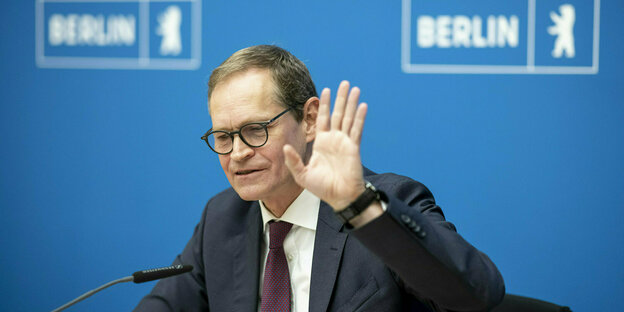The new elections will not change much. Precisely for this reason the AfD could benefit. Politicians are concerned about this and are mobilizing to the polls.

Michael Müller to run for rerun of federal elections in Berlin on Sunday Photo: Fabián Sommer/dpa
SEDAN taz | Does Germany have to witness the partial rerun of the 2021 federal elections in Berlin? No, some say looking at the general data: on Sunday only one in five people in Berlin will be able to vote again, that is, less than one percent of those who have the right to vote in the entire country.
Yes, say those who are concerned about the message of these elections because they are the first big ones of 2024. The repetition of the elections must send a clear signal against right-wing extremism, which is why every vote counts, as stated by the SPD leader, Lars Klingbeil, at the beginning of the election campaign.
The traffic light coalition's majority in the Bundestag would not have been in danger if the Federal Constitutional Court shortly before Christmas had not limited the rerun to only 455 of Berlin's 2,256 electoral districts, unlike the Berlin State Constitutional Court. The Bundestag and the House of Representatives already made a decision in November 2022 due to the setbacks that occurred on the common election day and ordered a complete repetition at the state level, which led to the change of government from red-green-red to black- red in February. 2023.
However, the jurisdiction of the Berlin court was limited to the elections to the state parliament: in the matter of the federal elections, the decision fell to the Federal Constitutional Court, which decided a year later, almost two and a quarter years after the technical ruling . elections on September 26, 2021. The fact that party leaders like Klingbeil are pushing so hard to go to vote definitively on Sunday or do it earlier by voting by mail is precisely due to the few people with the right to vote and the concern about the low electoral participation. Because the AfD could benefit from it.
Make a statement at the ballot box
This would not have the expected consequences in the electoral districts or in other mandates. However, given recent revelations about the AfD's far-right activities, it would be a setback for current efforts to take a broad stance against the far-right. “Please send a signal on Sunday: democracy counts!” demanded Berlin's state returning officer, Stephan Bröchler, on Tuesday.
By the time the verdict was announced on December 19, the Left Party, which was weakening in the polls, breathed a sigh of relief in the party and parliament offices. Because if this were to be repeated completely, completely new elections would have been held in those two Berlin constituencies which, with the Leipzig II constituency, ensured the political survival of the Left Party from 2021: at that time it remained below the 5 percent threshold. and he only had three direct mandates. He governs with all his strength thanks to his electoral results in the Bundestag.
Although the partial repeat is not relevant for the majority of the traffic light coalition, its result affects several prominent representatives at the state level. Despite the small overall number of constituencies, changes seem possible in two of Berlin's twelve direct mandates, which do not include those won by the Left Party in 2021. This also depends on the big change in mood: While the SPD was ahead in 2021, the CDU is currently twice as strong as the SPD in most polls.
Michael Müller, for example, who will be mayor of Berlin until 2021, could lose his direct mandate from the SPD in the electoral district of Charlottenburg-Wilmersdorf, where the current Federal Family Minister, Lisa Paus (Greens), has also been running for many years. . However, he would remain in the Bundestag because he is protected by the SPD's state list, the list that allocates seats to parties without constituencies.